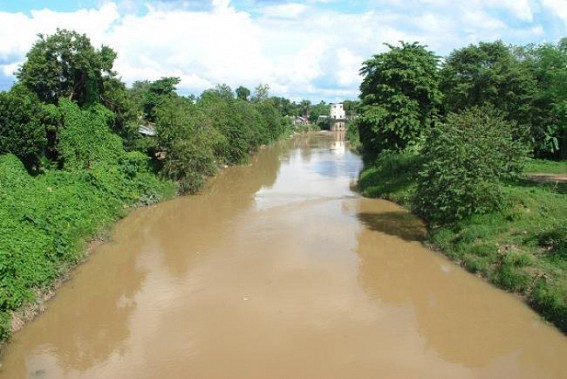Jayanta K Das

AGARTALA, December 26 (TIWN): Life line of Agartala and the main source of water for the people of the western parts of the state – Haora River have lost its splendor with the pollution finding their way into water sources are way above receiving water bodies’ natural assimilative capacity. Surface water pollution is increasingly becoming a source of conflict among upstream and downstream water user because the later suffer the effects of upstream pollution.
Quantity of water available for specific uses has almost declined with pollution at large. Recently the river water has lost its economic value as the quality declined. With progressive quality deterioration, water uses may successively shift from drinking water to bathing water, water for livestock, agriculture and industrial uses and so on. Pollution also creates water scarcity in regions which otherwise have abundant water resources.
Rivers are natural water bodies having various beneficial uses for mankind. Even after enactment of Water (Prevention and Control of Pollution)Act as early as in 1974, water quality continues to deteriorate at Agartala Battala Haora River – one of the major river as well as the only source of water for the people of Agartala.
The water of Haora river is the main source of drinking water for the people of Agartala and its surrounding areas from Champaknagar to Bangladesh border. Previously the river water was pollution free due to less anthropogenic interferences. Presently, the number of inhabitants on the banks of the river is increasing very fast. As the inhabitants of the river bank belong to the section Below the Poverty Line, they have to make kaccha latrines on the bank of the river and their excreta flow directly into the river. Due to this, the river water quality has deteriorated to an alarming condition now.
According to the 2004 survey report of the state pollution control board, that remained unchanged till today, it was observed that 1095 numbers of kaccha latrines are present on the banks of Haora river of which 1032 numbers of kaccha latrines directly discharge human excreta into the river and during flood human excreta from the remaining 63 numbers of kaccha latrines (Dug well) also flows into the river. The report also says that if any individual generates 1 Kg excreta per day, then the total amount of excreta that goes into Haora river everyday is 6654x1=6654 Kg.
However according to the highly placed source of the pollution control board, once a day will come when the people of the state will fail to remember the river Haora as the water in the river is dying at large. The source further said that the survey report of 2004 which remained unchanged till today had already been submitted to the state Urban Development department. But to mention here the department has not taken any necessary steps further to cope with the worsen situation of the Haora River. Therefore it has been always a matter of concern for the state govt. that has always been played a negligence role on bringing the worsen situation under control.
Talking to TIWN the Chief Executive Engineer of the DWS department B.K. Debbarma informed that though the department is conducting regular sample test of the river water for its supply but the if the contamination of the pollution rise at large then the Haora water purification plant will fail down to cope with the situation, and as a result the water supply will be stopped.
However, according to the environmental analysis the untreated sewage, human excreta( approx.6654 Kg/day) are directly discharged into the Haora river everyday from 1095 numbers of kaccha latrines of 1145 households on the river banks. It is also seen that Bacterial contamination including pathogens and solid wastes from different sources like cremation ground etc. are discharged directly into the river in the urban areas.
Therefore the downstream of Haora river that lies around Agartala is heavily polluted and the water of this river is not suitable for drinking, bathing and other domestic uses. However to keep the river living and useful it is necessary to take some conservation work as early as possible.
- 'Intolerable.....' Corporators Lodged FIR against Madhabi Biswas over 'Insane Video' on social media targeting PM & Mayor
- Blood Donation Camp Organized in Sipahijala District
- Yuvrajnagar Panchayat Samiti Chairperson's Husband Denies Molestation Allegations
- CPIM Submits Memorandum for Fair Voter List Revision
- 23 Panchayats in Gauranagar Block Receive Computers, Printers, and LED TVs



